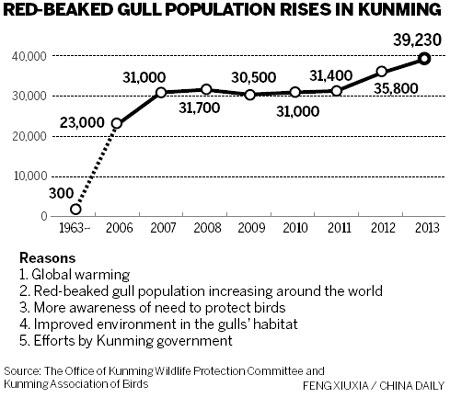Red-beaked gulls get warm welcome

Every winter for the past 29 years, red-beaked gulls have migrated to Kunming, Yunnan province, and this year is no exception, despite the unexpected snowfall and low temperatures in the province last week.
The birds fly south each year from Siberia to escape the harsh winter weather, arriving normally in November and staying until March.
Their stay in the plateau province in Southwest China is aided by helpful policies from managers at the local wetlands and parks, who maintain healthy habitats and provide additional nourishment.
Indeed, this year saw a record high of 39,230 red-beaked gulls arriving in Kunming, most of them setting down in the nearby Dianchi Lake and Green Lake Park, according to a survey conducted over the weekend by the Office of Kunming Wildlife Protection Committee and the Kunming Association of Birds.
The gulls make use of 30 natural habitats across Yunnan, mostly lakes and wetland reserves, their presence encouraged by free food provided at the main habitats by wildlife authorities. In addition, management bureaus work to keep the gulls' wintering grounds clean and free from hazards.
"The birds arrived 15 days early this winter, and we have been giving them 60 kg of food each day," said Yu Wanshen, deputy director of the Landscape Administration Bureau in Wuhua district, which manages Green Lake Park.
Due to the surprise snowfall in Kunming last week, Yu's bureau doubled the food ration at the park, at a cost of 700 yuan ($112) per day.
The park is cleaned every week to ensure a hygienic environment for both birds and visitors. The birds' droppings pollute the water at the wetland site, and so the bureau replaces at least 8,000 cubic meters of water each day, Yu said.
"Each winter, my park spends between 750,000 and 1 million yuan to baby-sit the birds," Yu said.
The weather in Siberia is particularly cold this year, and so the birds may end up staying in Yunnan long than usual, he said.
In the area of Dianchi Lake, the management committee also provides 90 kg of food per day.
In addition, the committee employs 10 workers to patrol the lookout platform from which visitors view the lake and feed the birds.
In the past, some visitors have deliberately harmed the birds, and the authorities now provide visitors with clear warnings against such behavior, which they mostly respect.
Any injured gulls are collected and taken to the Kunming Bureau of Forestry's wildlife protection center for treatment, according to the committee.
"I was astounded to see so many birds flying over the water, and I knew they had a good life in Kunming," said Zhang Chusheng, a 39-year-old accountant in Kunming.
"Sometimes we have to provide them with a relaxing environment, and I believe they will continue to visit Kunming."
Li Yingqing and Guo Anfei contributed to this story.
huyongqi@chinadaily.com.cn


















